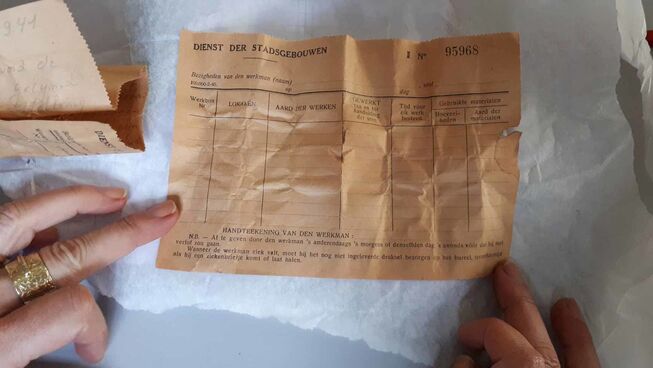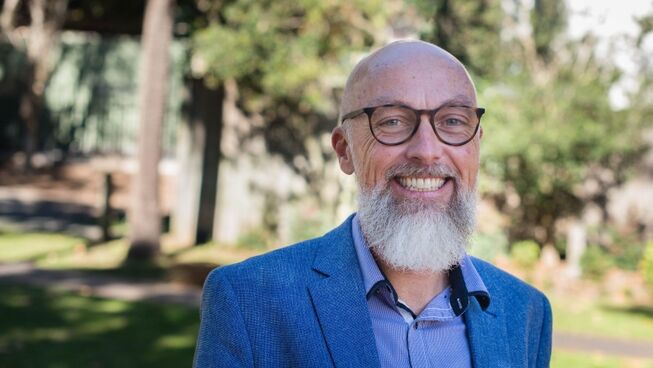
If you could travel forward in time what would be the most important advice you would wish someone to know in 2100? What would you wish to warn the public about in eighty years times? And what would seem important to us now, that would not be an issue then?
Well time travel isn’t a reality, but time capsules are, and a recent discovery in Belgium has given us a small insight into what some people back in 1941 thought that we might need to know in the future.
Restoration work of the roof of St James church in Antwerp unearthed a matchbox stowed away in an ornamental hanging, and it contained a note written on a work coupon; a message from the past to the future.
Four building workers back in the day wrote the note, then placed it safely there in the knowledge it would not be found for some time. It makes for an interesting read:
When it’s time for this ceiling to be repainted, we will no longer belong to this earth. We must tell our successors that we have not lived easy lives. We’ve experienced two wars, one in 1914 and one in 1940, that has quite an impact, eh? We stand here working, dead with hunger, while they squeeze the last cent out of us for a little food.
Imagine living through not one, but two world wars. Imagine living life on the edge all of the time, dying of hunger just to get a meal. That was commonplace across Europe between the wars. And one wonders what wisdom is proclaimed from that church today, and if it is as effective as the wisdom of those four lowly workmen.
But the note goes on, and this is where it gets interesting for us in the future, especially in the event of another war:
Make sure you stock your houses well, with rice, coffee, flour, tobacco, wheat, and grain, so you can feed yourself! Enjoy life while you can. Don’t wait to find another woman, and for those who are married, take care of your home! Cheers, lads!
To which we might add, “toilet paper!” It’s not so much that a war has broken out across the world over the past year, but the COVID-19 crisis has seen people across the globe pretty much do the same stockpiling. Though one wonders if those four men would be dismayed at the sight of supposedly sane human beings fighting over four-ply in the aisles at Coles or Woolies.
And how about flour, rice, pasta? Those tick all the boxes, though a lot more processed food than those four workers could ever have imagined, to say nothing about meat, which was likely a perishable luxury.
So it’s the staples of life that are most important in the crunch times. Except for the tobacco of course, which is a staple of death these days! One wonders what these four would have made of Australian cigarette packets with their squeamish pictures of cancerous lungs and mouths. Seems almost odd to add that in, but clearly it was the one small pleasure for those living on the edge and close to poverty.
What might we keep on the list? Coffee, of course! And no tea to be mentioned. Australians have given themselves over to the pleasure of coffee, and a good thing too. We’d definitely go with that.
But you sense the precarious nature of life here, don’t you. Enjoy it while you can. Eighty years is a long time but this note shrinks the gap. Mind you, there are things we often take for granted today would have been unimaginable luxuries back in 1941. There’s also a greater sense today that the goal of life is to be happy, rather than a byproduct of other aspects of life.
And relationships. Notice how much of life is about relationships. When they say “Don’t wait for another woman”, they’re meaning “Go out and find that right one, don’t hang around.” It speaks volumes about the precariousness of 1941 in war-torn Europe.
I like the touch about those who are married. “Take care of your home”. In the midst of turmoil and strife it can be easy to neglect that, or to look outside one’s home for the comfort that we feel home does not bring us.
Now there’s nothing deeply philosophical about the advice, it's homespun wisdom. These were likely unschooled workers doing a thankless task. And they spoke of their own deaths matter-of-factly. It will happen. Death marches on inexorably. The rest is a struggle to survive and a desire for happiness.
Yet has much changed in the past eighty years? Despite the huge transformations across the globe, the advances of technology, the levels of communication, the travel, the education and the sense of progressive among the most advanced nations, so much of our lives revolves around the same matters: Surviving hardship, finding enjoyment, providing for the necessities of life, finding meaning in loving relationships.
Perhaps all we would need is to package up the matchbox, add our names and the date to it (after crossing off the word “tobacco), and putting it back in the ceiling ornament for another eighty years. Humans have not changed all that much.
It’s reminiscent of the wisdom book in the Bible, Ecclesiastes, written by someone whose work was meaningful and significant beyond the imagination of these four men, and whose experiences of life, love and fulfilment would have made even ours seem anaemic.
Some say King Solomon wrote the book, others say not, but don’t let that issue distract you from the fact that for all that difference, and the three thousand year gap between then and now, the words of that book ring the same tone as the matchbox note.:
Go, eat your food with gladness, and drink your wine with a joyful heart, for God has already approved what you do. Always be clothed in white, and always anoint your head with oil. Enjoy life with your wife, whom you love, all the days of this misty life that God has given you under the sun – all your misty days. For this is your lot in life and in your toilsome labour under the sun. Whatever your hand finds to do, do it with all your might, for in the realm of the dead, where you are going, there is neither working nor planning nor knowledge nor wisdom. (Ecclesiastes 9:7-10)
The word “misty” is a better translation than the often utilised “meaningless”. The writer, like these four workmen, is not saying life is meaningless, but that it is precarious, it's like the morning mist that is there, then suddenly at the rising of the sun, is gone.
So who knows when the things you have now will be taken? Who knows whether the joys you cling to will slip from your grasp and when that might happen if it does? Is there anything that you holding on to that could not be taken away from you in an instant? Those are still the questions today!
The human condition of 3000 years ago is the human condition of 1941, is the human condition of 2020, and will be, I assume, the human condition of 2100. Many things change, but our deep fears, hopes, desires and dreams as humanity remain the same.
And the write of Ecclesiastes is as dead as those four men, who remained unknown until so recently. And of course, the great irony is that while there has been huge conjecture over the name of the writer of that famous book, the names of those four mean have been written down. We know who they are, and we thank them for their humble service to the future.
So we salute you, John Janssen, Jul Gyselinck, Louis Chantraine, and Jul Van Hemeldonck, for you have given us ageless wisdom, and we could do worse than send it on its way to our future generations in eighty years time, when we too will have joined you as those who no longer belong to this earth.


